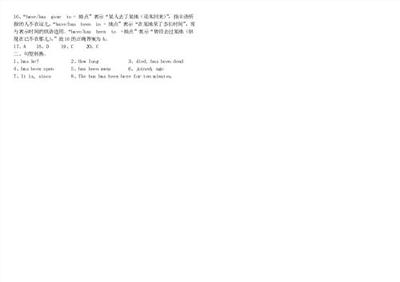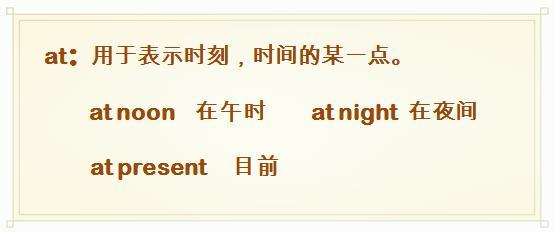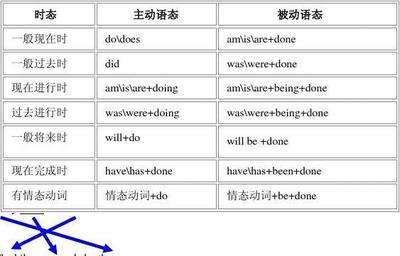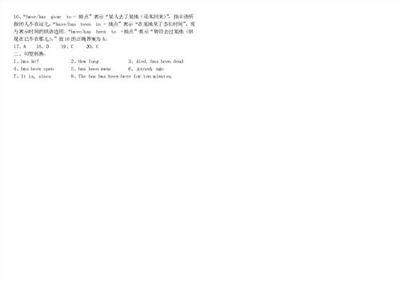be acclaimed be alleged
be annihilated be born
be dazed be dubbed
be fined be headed
be horrified be hospitalised
be indicted be inundated
be jailed be overcome
be paralysed be penalized
be perpetrated be populated
be reconciled be reprieved
be reunited be rumoured
be scheduled be shipped
be shipwrecked be staffed
be stranded be strewn
be suspended be swamped
be wounded
用法举例:
It was acclaimed as a great discovery.
那被赞誉为伟大的发现。
He is alleged to have kicked a policeman.
据称他曾踢过警察一脚。
The enemy was annihilated.
敌人被歼灭了。
The Owens will move to a new flat when their baby is born (或has been born).
孩子出生以后,欧文斯全家将搬到一套新的房间去住。
We first saw a documentary which was dubbed in English.
我们先看了一部英语配音的纪录片。
He was fined£500. Which we all thought served him right.
他被罚款500英镑。我们都认为他活该如此。
She is walking as if she doesn’t know where she is headed for.
她一直走着就好像漫无目的似的。
当然,它们用于主动语态也是完全可能的。
如:
The people acclaimed him king.
人民拥戴他当国王。
They alleged out that they had been unjustly dismissed.
他们声称他们被不公平地解雇了。
They dubbed him Fatty because he was so fat.
他们管他叫“胖胖”,因为他很胖。
They fined him $25.
他们罚了他二十五美金。
Then we headed for home.
然后我们就往家走了。
英语不用被动语态几种的情形
1. 谓语为连系动词时,不用被动语态。
如:
He looked fine.
他气色好。
The food tastes delicious.
这食物味道很好。
2. 谓语为不及物动词(短语)时,不用被动语态。
如:
The war broke out in the end.
战争终于爆发了。
I happened to meet him there.
我碰巧在哪儿见到了他。
3. 宾语为不定式、动词的-ing 形式或从句,表示主语的一些想法、爱好或愿望时,一般不用被动语态。如:
He decided to go with us.
他决定跟我们一起去。
I want to buy a computer.
我想买一台电脑。
4. 宾语是相互代词、反身代词、同源宾语等时,一般不用被动语态。
如:
We should help each other.
我们应该相互帮助。
We live a happy life here.
我们在这儿过着幸福的生活。
He thinks of himself too much.
他对自己想得太多。
5. 宾语是处所、地点时,一般不用被动语态。
如:
We will reach the station in two hours.
我们再过两个小时就会到站了。
He has gone to London now.
他去伦敦了。
6. 谓语部分(动词与宾语) 是一个不可分割的动词短语时,一般不用被动语态。
如:
The ship set sail this morning.
这艘轮船今天早晨起航了。
He saw the doctor yesterday evening.
他昨天晚上看了医生。
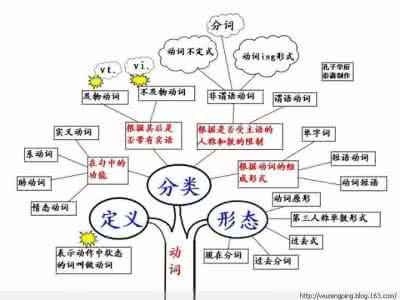
Practice today:
Choose the best answer for each of the following sentences
1、主动:We have studied English for 3 years off and on at the spare-time school.
被动:_________________________________.
2、主动: They had produced 100 tractors by the end of last year.
被动:_________________________________.
3、主动: We shall build several big modern power plants in our city next year.
被动:________________________________.
4、主动:I shall send my second boy to school next September.
被动:_______________________________.
答案与解析:
1.English has been studied for 3 years by us off and on at the spare-time school. (have随新主语变为has)
我们已经在夜校里断断续续地学了三年英语了。
2.100 tractors had been produced by the end of last year.
到去年年底我们已生产出一百台拖拉机。
3.一般将来shall (will) do,被动变do为be done 即由shall do或will do变为shall done或will be done。
过年我市将建立几座大型现代化的发电厂。
(shall do中的shall要随新主语变为will, do为be done.)
4.My second boy will be sent to school next September.
过年九月我将送我次子去读书.
 爱华网
爱华网
